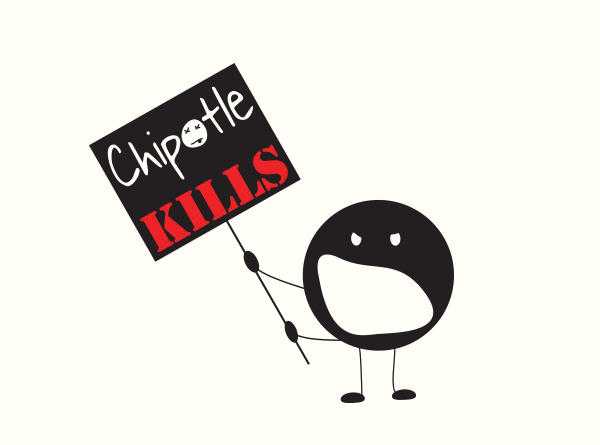 I don’t eat at Chipotle, for the obvious reason that it’s disgusting. That’s not the reason I give when people suggest it, since I know they’ll argue, “No it’s not,” which is a difficult argument to combat with logic. Instead I say, “I’ve been to Chipotle twice, and got food poisoning both times.”
I don’t eat at Chipotle, for the obvious reason that it’s disgusting. That’s not the reason I give when people suggest it, since I know they’ll argue, “No it’s not,” which is a difficult argument to combat with logic. Instead I say, “I’ve been to Chipotle twice, and got food poisoning both times.”
This is, in fact, true, and even if it wasn’t, it would still shut people up if said with sufficient conviction. It’s a convenient fact of history that lets me avoid eating at Chipotle, which I don’t want to do because of the aforementioned obvious reason.
But it’s not a good argument. First, it’s argument by anecdote, which is primarily not an argument because evidence of something apparently happening to someone once, according to them, is the least reliable source of information short of active lying and delusion. This wouldn’t stop it from being propagated, of course: I’m sure at least one person with whom I’ve used this has told somebody else “I know a guy who got food poisoning from Chipotle TWICE,” and maybe it’s already passed far enough down the chain to become “This guy once walked into a Chipotle, took one sip of the soda, and his FUCKING HEAD EXPLODED.” I’ve heard more absurd things about better restaurants.
It wouldn’t even be a good argument if I’d collected medical evidence of each occasion. Humans are notoriously bad statisticians, so everyone I know would be fine with me never eating at Chipotle again, as if I had weighed my options and made a valid deduction about my relationship with Chipotle and the risks involved. In a sense, I have, since the end result is that the sight and smell of Chipotle food make me even more nauseous than before they made their guest appearances in and subsequent violent exits from my stomach. What I say, however, is “I’ve been to Chipotle twice, and got food poisoning both times,” implicitly implying that Chipotle will always give me food poisoning due to some inherent quality of the food. This does not stand up under scrutiny: I didn’t keep track of what else I was consuming those days. I didn’t take into account my health at the time, or the possibility I was eating something to which I was allergic. I didn’t test for the possibility that I had contracted a totally unrelated stomach bug. And even if all these things came up negative, and it was the food, there’s still not nearly enough data to conclude that I will always get sick from eating at Chipotle. The fact that I got sick twice from two visits makes me either a very unlikely outlier, or physically adverse to something commonly included in what they claim is meat. Because Chipotle is revolting anyway, the world will never know.
Facts and stats aside, my story will carry absurdly more weight in any friendly discussion about the quality of Chipotle, simply because something happened. The much more powerful fact that millions of people have successfully ingested Chipotle without getting food poisoning has never even been brought up to counter my argument, because it’s boring. Nothing happened to them. They don’t even remember specific instances of going to Chipotle and not getting sick, so they don’t have a good anecdote. I win.
This example of social grease just helps me avoid eating things I don’t like and shortening the conversational preludes to me not eating them. It’s pretty harmless, and Chipotle probably doesn’t suffer unduly from my anecdote.
Now let’s say I went to Chipotle with my best friend, picked up a soda and made snide comments about his food choices while he wished my head would explode, then he got sick and died.
I might be able to see past my own grief, consider the possibility that any food would have killed him that day, or that he was particularly susceptible to something and didn’t know it, or considered the million other possibilities. I’d like to think I would, at least after I sued the restaurant for emotional damages and said, “Yes,” when my lawyer put me on the stand and asked me, “You’ve gotten food poisoning every time you’ve gone to Chipotle, haven’t you?”
The other lawyer would point out the very facts that I’ve been pointing out, and win or lose, everybody would hate him for it. Or, more likely, Chipotle would suck up the initial bad press and settle out of court for seven or eight figures.
So far, this is just business as usual in America.
Then it gets real.
Chipotle killed my best friend. I start a campaign against Chipotle. I use my own sicknesses and the loss of my friend to spearhead a campaign against them; how could they sell food that might kill people? I start collecting stories about other Chipotle victims, and discover there are other people who have both eaten food from Chipotle and died in the same day. I get their stories, start some websites and raise some money. My documentary is called “Chipotle: The Truth,” and gets 7 million views on youtube. There are so many examples of people eating Chipotle and dying, people start to wonder, how could Chipotle knowingly kill all these people? Some fringe groups develop asserting that Chipotle is being used by the government as a form of population control.
By this time it’s been conclusively determined the my friend had a heart defect and an upset stomach from the bottle of Jack Daniels that he drank the night before, but that doesn’t matter. Other people have died from unexplained causes after eating at Chipotle! Some of those people were in their 80s! Is the government trying to weed out old people with Chipotle because they know social security is bankrupt and they can’t keep paying them? I don’t know! Do you know? Get the facts!
Enter the internet. The facts, at this point, are fifty or a hundred websites fueled with anecdotes about people having stomachaches at Chipotle. You need maybe a dozen actual stories, each maybe two or three pages, because half an hour of honest research is all that most people are likely to do. Repost these stories around all these websites. With the sob stories holding the door open for people, who, after reading six or seven, are reasonably, and possibly rationally, convinced something may be afoot, I can now say pretty much anything I want, up to and including that Chipotle is sprinkling uranium in every burrito as a form of mind control. Anyone who disagrees, or points out that no uranium has been found in Chipotle food, or that the level of fluoride in it wouldn’t kill a sick mosquito, is part of the Chipotle Intestinal Complex, or just hasn’t read all twelve stories.
Going after Chipotle is its own industry now. A hundred websites become a thousand, all sharing the same anecdotal tales, with a random smattering of nonsense theories. If four hundred scientific studies come out saying that Chipotle is, statistically, the healthiest thing you can eat, and the daily death rate among Chipotle patrons is half that of the rest of the civilized world, it doesn’t matter, because there are a thousand websites that agree that Chipotle is killing us all. It takes a long time to read those, but at least they’re more interesting than scatterplots.
Now, anyone who hears “Chipotle murders” can go home and punch that into Google and get a thousand or more hits. All of these sites are plugged into every available social media outlet, and, pretty much by definition, run by people with nothing better to do, so they’re pumping more and more information into the internet to build the case against Chipotle. The scientists who spent two years disproving the Chipotle uranium scandal four hundred times have gone back to trying to cure cancer, and are probably not on Facebook ten hours a day, so the balance of media is massively tipped in favor of Chipotle seeming to be a corporation with murder on the mind. Even typing in “Chipotle is good for you” just brings up people trying to refute the “Chipotle murders” camp, and arguments to the effect of “we have four hundred studies saying Chipotle is just fine” are met with “we have two thousand sitations [sic] that say Chipotle killed Jesus! Besides, you’re all just citing the same four hundred papers over and over again, and one of those papers had a typo on page thirty-six!” But those sites don’t matter, because nobody who thinks Chipotle murders people is going to type “Chipotle doesn’t murder you” because lots of things don’t murder you and most of them are boring. They’re going to look for examples of Chipotlicide, and they’re going to find a few dozen, because the laws of probability all but demand a few dozen people eat at Chipotle and proceed to die, and those few dozen look like millions when they come up in two thousand separate sources.
That small amount of awful under the kaleidoscope of emotion and warring opinion stamps out the long forgotten cry of the scientist: to support something rationally requires openly seeking out opposing views. Holding an opinion is not particularly interesting or useful; the opinion becomes interesting and useful after examining the evidence against it, considering alternative explanations and counter arguments, and establishing the criteria or set of events that would require the opinion to change it if those things happened. “My friend is dead” just packs more punch, can be said before the listener falls asleep, and reminds everyone of how helpless they felt when someone in their lives died. The desire to make a difference and the desire to fix the unfixable and the desire, for one fucking second plus the foreseeable future, just to be RIGHT, overwhelm the need to remember that maybe something loudly believed is wrong, and now there’s too much wrong out there to get through. Almost nobody has time to read the four hundred papers against and the dozen for, and check the credentials, funding, and reputation of every person involved in writing all of them. The people who do have the time are the scientists, so somebody begs them to address the issue, but the scientists say, “Look, we dealt with that, nobody reads the papers except the occasional unemployed journalist, and it’s much more fun blowing up particles in the accelerator, so piss off.”
Chipotle rebrands, but it’s too late. Sales plummet, legislation is passed, and the Chipotle quarterly budget now has an alarmingly large overhead item labelled “Dealing with the crazy.”
“Chipotlicide” is added to the Oxford English Dictionary, despite nobody being able to agree on what it means.









